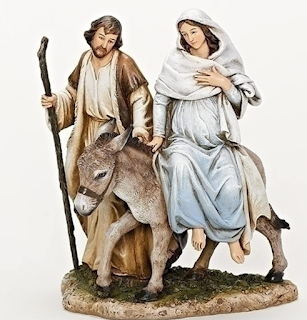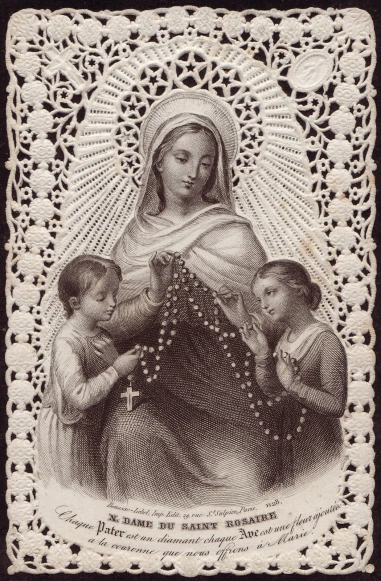We find holy water, one of the most readily-recognized sacramentals of the Church, utilized by our priests in numerous rites and ceremonies of the Church -- such as the blessing of religious articles, Baptisms and funerals, and general blessings of the Faithful in holy Mass -- but it's also an important staple of the Catholic home. No home should be without it! Blessing oneself with holy water upon entering or leaving our own home gains us the same indulgences as we do upon entering a Church and blessing ourselves (though the presence of the Blessed Sacrament kicks all prayers up a huge notch, of course!).
Holy water is well known as a strong defense against evil spirits, in general, and is carried by some Moms I know in their purses! (They are really "packing!")
In dangerous times, the head of the household (or anyone!) may bless all the windows and doors -- and his family! -- with a sprinkle of holy water at nightfall or when deemed necessary. Naturally, it would be irreverent to splash or play in holy water (a thing to be sure our children realize), but it is permissible to scoop up a little holy water for little ones who cannot reach the font so that they may dip their fingers
in from the basin of our hand. This is not considered "playing patty fingers in the holy water." (Quiet Man reference familiar to many...)
 |
Maureen O'Hara in a still from the movie,
"The Quiet Man" (1950), also starring
John Wayne and Barry Fitzgerald. |
Blessing ourselves with holy water, wherever we may find it, is an automatic reflex for many of us, but
not an act that should be taken for granted, such grace attaches to our pious attention! It's a simple procedure, but a beautiful one really. Dipping the fingertips of our right hand in the Holy water, we cross ourselves in the familiar Catholic blessing, touching first, the forehead, then breast, left shoulder, right shoulder saying: In the name of the Father, and of the Son, and of the Holy Ghost." But it's equally beneficial and traditionally a pious practice in some places to pray:
By Thy Precious Blood and by this Holy Water, cleanse me (him/her) from my (his/her) sins, O Lord.
When they were still tiny, we taught our children the significance of the tactile action of the blessing that incorporates so well the words of both of these prayers. At the same time that we trace the sign of our salvation, the cross of Christ, upon ourselves, we should be reminded to love our dear Lord with all our mind (as we touch our forehead), all our heart (as we touch our breast), and all our strength (as we touch our shoulders).
Blessing oneself with holy water is three prayers in one: one connected with the grace of the sacramental inherent within the holy water, itself, one verbal (the words and meaning of the prayer), one mental (understanding the significance of the tactile forming of the cross upon ourselves). It's such a wonderful thing as a Catholic to be able to honor our triune God with a trinity of a prayerand sacramental like this -- upon all our comings and our goings in our most important places: our own homes and Jesus's home!
Good Things to Know About Holy Water
+ Many don't know that it is permitted that the sick or spiritually oppressed be given sips of holy water. Taking it in small amounts, or adding a few drops to foods is common, but it should never be consumed as a beverage.
+ The salt added to most holy water acts as a preservative, but if your holy water has gone bad (green), the proper way to dispose of it is the same as for all other sacramental: it must be returned to the earthly elements. In other words, dig a hole and pour it into the earth.
+ Interesting to note, too, that holy water is a somewhat renewable resource. As long as your container of holy water is half full, you can fill it to the top, rendering the new water, once added, equally blessed. In other words, it is not "half strength" or diluted. Once the 'added-to' bottle is again half empty, it can be filled again. I tell my children it is like the miracle of the loaves and fishes -- or, perhaps even more accurately, the ever increasing holy water works along the same principle of God's providence and power that allows for a crumb of the Sacred Host to contain in its entirety still, Christ in His entirety, body, blood, soul, and divinity, the very same as an entire Host.
Where Does Holy Water Come From?
Holy water is blessed notably on the Feast of the Epiphany (January 6) -- and any time thereafter that holy water is needed.
First, the salt to be added to the water is exorcized and blessed. Then the water itself is blessed with these words:
I exorcise thee in the name of God the Father almighty, and in the name of Jesus Christ His Son, our
Lord, and in the power of the Holy Ghost, that you may be able to put to flight all the power of the enemy, and be able to root out and supplant that enemy and his apostate angels; through the power of our Lord Jesus Christ, who will come to judge the living and the dead and the world by fire.God, Who for the salvation of the human race has built your greatest mysteries upon this substance, in your kindness hear our prayers and pour down the power of your blessing into this element, prepared by many purifications. May this your creation be a vessel of divine grace to dispel demons and sicknesses, so that everything that it is sprinkled on in the homes and buildings of the faithful will be rid of all unclean and harmful things. Let no pestilent spirit, no corrupting atmosphere, remain in those places: may all the schemes of the hidden enemy be dispelled. Let whatever might trouble the safety and peace of those who live here be put to flight by this water, so that health, gotten by calling Your Holy Name, may be made secure against all attacks. Through Our Lord Jesus Christ, Thy Son, Who liveth and reigneth with Thee in the unity of the Holy Ghost, God, world without end. Amen.
* Holy water may be easily obtained in the vestibule or entrance of every true Catholic Church and is placed there specifically for the easy access of the faithful. If the dispenser is not easily found, contact the pastor. If yours is a mission church, again, contact your pastor or visiting priest to obtain holy water. It's a common request, and he will be more than happy to supply your family with this sacramental so beneficial to your use.
* Important to note: Know that the exorcism of water is omitted in the new rite, just as it's been removed from the blessing of salt! Be sure that all your holy water is obtained through a verifiably ordained priest.
* Also, note that "regular" holy water should not be confused with Easter Water -- or the miraculous
water obtained from Lourdes or other holy shrines (Mother Cabrini's spring, as another instance.) Waters from sacred places, unblessed, are not sacramentals -- which is not to say they do not have unique inherent blessings, but they cannot be used in place of holy water.
 |
Fr. Philip offering Mass at the
Franziskanerkirche in Uberlingen,
Baden, Germany |
Easter water, or baptismal water, is the water that is blessed on Holy Saturday (the day before Easter) and is used to baptize Catechumens. This water receives a more solemn sort of blessing than "regular holy water": the Easter Candle is dipped into it three times, and the priest blows his breath over it thrice, recalling the Spirit over the waters at Creation, and the Spirit causing the waters of Noe's flood to subside, and how the Spirit appeared as a dove over the waters at Christ's Baptism. If you've ever attended the beautiful Holy Saturday blessings and read the prayers as they are prayed over the water on this day, you can't help but be impressed by the special strength and solemnity added to the Easter water!
Any clean water can be used in Baptism, of course, and often is, as in cases of emergency; but the use of Easter water is preferable in ordinary circumstances.
And then there's...
Gregorian Water -- holy water mixed with wine, salt, and ashes -- which is used in the consecration of churches, altars and altar stones. And that's a whole other post: the consecration of churches.
(Stay tuned.)
From noon on November 1 to midnight on November 2 (a span of 36 hours), the Catholic faithful, as often as they visit a church to pray for the faithful departed, and recite six times during each visit the Our Father, Hail Mary, and Glory Be for the intentions of the Church, may gain a plenary indulgence applicable only to the souls in purgatory, under the usual conditions of:





















